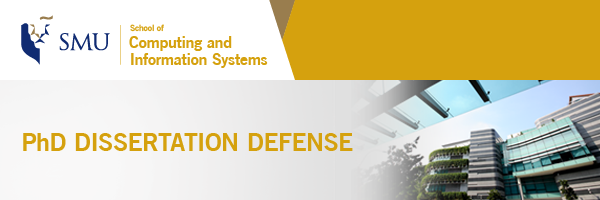| |
 |
|
|
Weakly-Supervised Semantic Segmentation
|
|

|
CHEN Zhaozheng
PhD Candidate
School of Computing and Information Systems
Singapore Management University
|
| Research Area
Dissertation Committee
Research Advisor
Dissertation Committee Members
External Members
- LIN Guosheng, Associate Professor, School of Computer Science and Engineering, Nanyang Technological University
|
|
|
| Date
13 December 2023 (Wednesday)
|
| Time
2:00pm – 3:00pm
|
| Venue
Meeting room 5.1, Level 5
School of Computing and Information Systems 1, Singapore Management University, 80 Stamford Road Singapore 178902
|
|
Please register by 12 December 2023.
We look forward to seeing you at this research seminar.

|
|
|
|
| About The Talk
Semantic segmentation is a fundamental task in computer vision that assigns a label to every pixel in an image based on the semantic meaning of the objects present. It demands a large amount of pixel-level labeled images for training deep models. Weakly-supervised semantic segmentation (WSSS) is a more feasible approach that uses only weak annotations to learn the segmentation task. Image-level label based WSSS is the most challenging and popular, where only the class label for the entire image is provided as supervision. To address this challenge, Class Activation Map (CAM) has emerged as a powerful technique in WSSS. CAM provides a way to visualize the areas of an image that are most relevant to a particular class without requiring pixel-level annotations. However, CAM is generated from the classification model, and it often only highlights the most discriminative parts of the object due to the discriminative nature of the model.
This dissertation examines the key issues behind conventional CAM and proposes corresponding solutions to generate complete CAM. Furthermore, it explores the applicability of the recent visual foundation models, such as the Segment Anything Model (SAM), in the context of WSSS. This exploration provides insights into the potential and challenges of deploying visual foundation models for WSSS, facilitating future developments in this exciting research area.
|
|
| Speaker Biography
CHEN Zhaozheng is a Ph.D. candidate in Computer Science at Singapore Management University. He started his Ph.D. studies in 2020 under the supervision of Asst. Prof. SUN Qianru. Before this, he obtained his Bachelor's degree in Computer Science and Technology from Shandong University. His research focuses on weakly-supervised semantic segmentation. His first-authored papers are published on top venue CVPR. He was awarded the SMU Presidential Doctoral Fellowship (AY2022, AY2023) and AY2023 SCIS Dean's List for outstanding research. In his free time, he enjoys cycling.
|
|